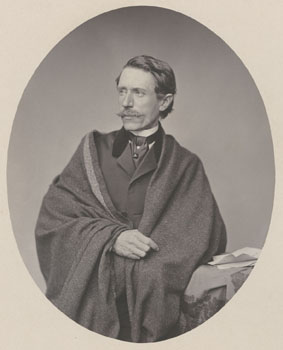Moritz Wagner facts for kids
Moritz Wagner (born October 3, 1813, in Bayreuth, Germany – died May 31, 1887, in Munich) was a German explorer, collector, geographer, and naturalist. He loved to travel and study nature.
Wagner spent three years (1836–1839) exploring Algiers in North Africa. There, he made a very important discovery about how new species of animals can form. His idea was based on studying beetles that could not fly. He thought that if a group of animals was separated by geography, like a river or mountains, they could change over time and become a new species. This idea, called geographical isolation, became very important in the theory of evolution.
Later, from 1852 to 1855, Wagner traveled with a friend through North America, Central America, and the Caribbean. He also visited the Lake Sevan area in Armenia in 1843. Moritz Wagner passed away in Munich when he was 73 years old. His brother, Rudolf, was also a scientist who studied the human body.
Contents
Wagner's Discoveries
Moritz Wagner started his career as a geographer, which means he studied the Earth's surface and its features. He wrote many books about the geography of North Africa, the Middle East, and tropical parts of America.
But he is best known for his work as a naturalist and collector. A famous evolutionist named Ernst Mayr explained how important Wagner's ideas were.
How New Species Form
During his time in Algeria, Wagner carefully studied flightless beetles called Pimelia and Melasoma. He noticed something interesting: each type of beetle lived only in a specific area along the north coast. These areas were separated by rivers flowing from the Atlas mountains to the Mediterranean Sea. If you crossed a river, you would find a different, but very similar, type of beetle.
Wagner saw similar patterns in the Caucasus mountains and the Andes valleys. This led him to believe that new species form when a small group of animals moves away from their main group. They need to be separated for a long time to become a new species. He wrote:
- "... a new species will only [arise] when a few individuals cross the borders of their home... a new type will never succeed... without a long separation of the colonists from the other members of their species."
This was one of the first times someone described how geographical speciation works. It means that new species can form when groups are separated by physical barriers. He also said that "Organisms which never leave their ancient area of distribution will never change." This was a bit of an overstatement, but it showed his strong belief in geographical separation.
Challenges to Wagner's Idea
At first, many leading scientists, including Charles Darwin and Alfred Russel Wallace, did not fully accept Wagner's idea of geographical speciation. They thought other things were more important. Because of this, Wagner's idea was not widely recognized for a long time.
However, in 1942, Ernst Mayr brought Wagner's idea back into focus. He showed how important geographical speciation is. It then became a key part of the modern understanding of evolution.
Why Wagner's Ideas Were Important
Modern experts like Ernst Mayr agree that Moritz Wagner was the first to clearly explain geographical speciation. However, his "migration theory" also included some simpler ideas about how evolution works.
Wagner wrote letters to Darwin, saying that Darwin had missed the important role of geography in forming new species. Darwin first replied in a friendly way, agreeing that geographical separation was important. But later, Darwin found Wagner's arguments a bit too strong and one-sided. Darwin felt that Wagner did not give enough credit to natural selection, which Darwin believed was very important.
Other scientists also found Wagner's ideas a bit too extreme. For example, J.T. Gulick said that Wagner was right to point out the importance of geographical isolation. But he also said that Wagner went too far by claiming that new species could never form without it.
Ernst Mayr later helped to make Wagner's idea clearer. He explained that a new species develops if a group of animals becomes separated from its main group. During this time, they develop new traits that keep them separate even if the barriers disappear. Another scientist, Bernhard Rensch, also helped keep geographical speciation in mind. He saw it as the most common first step for species to split into new ones.
Today, the importance of Wagner's discovery is clear. His other ideas might have confused people for many years. But his main insight, gained from watching insects in nature, was a true breakthrough in understanding how life changes over time.
- "It took more than 60 years after 1859 until the leading specialists... [agreed] that this geographical approach was the way to solve the problem of speciation... a new species may evolve when a population acquires isolating mechanisms while isolated from its parent population."
Wagner's Books
- Reisen in der Regentschaft Algier in den Jahren 1836, 1837 und 1838. 3 volumes. Leipzig 1841.
- Der kaukasus und das Land der Kosaken. 2 volumes. Leipzig 1847.
- Reise nach Kolchis. Leipzig 1850.
- Reise nach dem Ararat und dem Hochlande Armeniens. Stuttgart 1848.
- Reise nach Persien und dem Lande der Kurden. 2 volumes. Leipzig 1851.
- Die Republik Costa-Rica. Leipzig 1856.
- Reisen in Nordamerika in den Jahren 1852 und 1853. (with Carl Scherzer) 3 volumes, Gotha 1861.
- Die Darwinsche Theorie und das Migrationsgesetz der Organismen. Leipzig 1868. (English edition: Wagner M. 1873. The Darwinian theory and the law of the migration of organisms. Translated by I.L. Laird, London.)
- Naturwissenschaftliche Reisen im tropischen Amerika. Stuttgart 1870.
- Die Entstehung der Arten durch räumliche Sonderung. [The origin of species by spacial separation] Gesammelte Aufsätze. Benno Schwalbe, Basel 1889.
 | Victor J. Glover |
 | Yvonne Cagle |
 | Jeanette Epps |
 | Bernard A. Harris Jr. |


